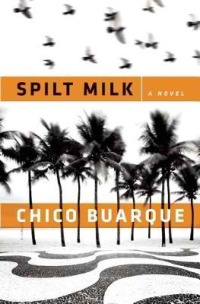Spilt Milk by Chico Buarque
 Monday, December 3, 2012 at 8:01PM
Monday, December 3, 2012 at 8:01PM 
First published in Brazil in 2009; published in translation by Grove Press on December 4, 2012
Spilt Milk begins with the rambling narrative of a hospital patient, Eulálio Assumpção, speaking to a girlfriend who, it soon becomes clear, is present only in his imagination. Assumpção is old -- he says his life has become "unbearably long, like a fraying thread" -- although whether he is actually one hundred years old, as he sometimes believes, is not entirely clear. Assumpção's connection to reality is tenuous. At times he believes his long-dead parents will be coming to rescue him from captivity. Other times he believes his daughter is arranging his discharge. Some days he is convinced he will not survive the night and asks for a priest to perform the last rites; other days he thinks he is being kidnapped.
Assumpção lives in his memories but his memories are indistinguishable from his dreams. "Memory is truly a pandemonium," he says, yet by rummaging around all sorts of things can be found. His memories resist chronology or any other order; they are called to mind by free-association. Whether those memories are reliable is another question. Assumpção recognizes that his memories have increasingly become memories of memories, copies that degrade each time they are reproduced. The reader is left to sort out truth from falsity in the confusion that is Assumpção's life in recollection.
With a minimum of well chosen words, Chico Buarque sketches Assumpção's long life and the colorful lives that surrounded him: the father ("the most influential politician in the old Republic") who took him whoring and introduced him to cocaine while he was still a child; the mother who wears tragedy well; the relatives who are misfits, criminals, and victims; the wife who taught him the true meaning of desire; the daughter whose husband leaves her during her pregnancy; the great-grandson born in prison, or perhaps in an army hospital, depending on how Assumpção remembers the story. Of course, whether we should accept these characters at face value is doubtful. Does Assumpção really have a great-great-grandson named (as are all his male descendants) Eulálio, "already a strapping young man of my size," who set fire to his school and stole jewelry from Assumpção's home so he could buy the latest mobile phones and phosphorescent tennis shoes? Not knowing quite what to make of Assumpção's stories -- no matter how confidently Assumpção tells them -- is part of the novel's appeal.
Assumpção's strongest memories are of his wife Matilde, his first and irreplaceable love, yet even here his account of their relationship is confusing and marked by contradiction. Assumpção was a jealous husband; whether that jealousy was founded is, like so much else in this novel, never clear. Assumpção believes Matilde abandoned him, although the timing and circumstances of that abandonment change each time Assumpção recalls them, as does Matilde's eventual fate. What shines through as trustworthy are elemental emotions: Assumpção's desire for Matilde and his despair at her loss. His life was full when they were together. After she left, the story of his life "would consist of many pages and little ink" -- empty pages. Perhaps his malleable memories of his daughter and of the offspring of his offspring are just an old man's last attempt to put words on the page.
Buarque's evocative prose captures the Copacabana of Assumpção's youth like sepia-tinted photographs. Still, it is the poignancy of Assumpção's life -- a long transition from privilege to poverty and perhaps, in the end, a life not entirely lived -- and the stark contrast of his memories of Matilde that make Spilt Milk memorable.
RECOMMENDED
Reader Comments